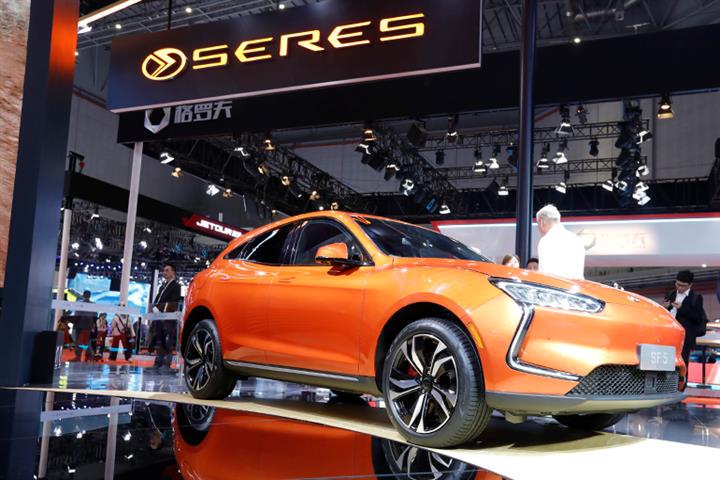 Huawei, Sokon Auto See 13-Fold Jump in Electric Car Sales in Jan.-April Period
Huawei, Sokon Auto See 13-Fold Jump in Electric Car Sales in Jan.-April Period(Yicai Global) May 5 -- Sales of vehicles produced by Chinese tech giant Huawei Technologies and its electric car-making partner Sokon Automobile soared 13 times in the January to April period from a year earlier.
Sales reached 22,752 cars in the four months ended April 30, Chongqing-based Sokon Auto said yesterday. Last month, sales jumped to 3,439, 13 times higher than a year ago and 8.8 percent up on March.
Huawei is working with Sokon Auto on Seres, a new energy vehicle brand, with Sokon in charge of production and Huawei providing technology and services related to autonomous driving and the Internet of Vehicles. The project marked the first attempt by Shenzhen-based Huawei to expand its business into smart vehicles.
Two models have been released so far, but sales of the first, the SF5, were poor. Huawei stepped up its input into the second model, the Aito M5, unveiled last December. The car has seen much stronger sales since deliveries began in early March.
The Aito M5 is equipped with a smart cockpit using Huawei's IoT operating system Harmony OS, along with a variety of other Huawei solutions.
Huawei's involvement in the Aito M5 was deeper than with the first Seres model in terms of both design and sales channels, according to Sun Shaojun, founder of the Car Fans sales service platform.
Since its launch, the new model has been the main production focus at Sokon Auto’s factory, and sales staff mainly recommend the new model, a salesperson at Huawei's flagship store told Yicai Global.
Data from Sokon Auto showed that Seres sales reached 3,160 units in March, of which 3,045 were of the Aito M5.
Though sales have surged, they are still a long way off an annual target of 300,000 set by Yu Chengdong, chief executive of Huawei’s consumer and auto division, who admitted last month that the goal is probably impossible because of the worldwide shortage of vehicle chips.
“Against the background of the global shortage of auto chips, it would be a miracle if first-year sales hit 100,000 to 200,000 units,” he said.
Yu attributed the missing of sale target mainly to the sharp rise in chip prices. A chip once priced at CNY10 to CNY20 (USD1.51 to USD3.03), now costs CNY2,500 (USD378.35) and each car needs nine of these chips.
“We can't accept such high speculative prices and would rather sell fewer cars,” he said.
Editors: Tang Shihua, Tom Litting